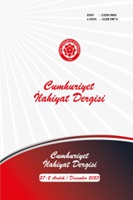Bir Nübüvvet Savunusu Olarak Mâverdî’nin (ö. 450/1058) Aʿlâmü’n-nübüvve Adlı Eserinin Değerlendirilmesi
The Evaluation of al-Māwardī’s Aʿlām al-nubuwwah as a Defense of Prophethood
Author(s): Ahmet Çelik, Eyüp GürSubject(s): History of Islam, Sociology of Religion, History of Religion, Qur’anic studies
Published by: Cumhuriyet Üniversitesi İlahyat Fakültesi
Keywords: Kalām; al-Māwardī; Prophethood; Alām al-nubuwwah; Reason; Rejection;
Summary/Abstract: Prophethood (nubuwwah) is a divine institution that teaches the healthy progression of relations between Allah and humans, as well as between humans and the universe. However, from another perspective, it is also considered a human institution. Some opponents of religion, lacking strong evidence to challenge the existence of Allah, direct their objections towards prophethood, which is seen as a manifestation of Allah’s attribute of speech (kalām). To counter the rejection of prophethood, scholars of theology (kalām), hadith, and Prophetic biography (sīrah) have compiled a body of literature known as Dalāʾil al-nubuwwah (Proofs of Prophethood). Their aim has been to collect proofs supporting prophethood as a response to these refutations and to dispel doubts regarding it. All extraordinary events occurring from before the birth until the death of Prophet Muhammad are considered evidence.During the fifth century, a notable figure in this tradition was the Shāfiʿī scholar al-Māwardī, who defended prophethood in his book Aʿlām al-nubuwwah (The Signs of Prophethood). Aʿlām al-nubuwwah has inspired subsequent works in this field due to its clarity and robust proofs. It became known by both names, Aʿlām al-nubuwwah and Dalāʾil alnubuwwah, as it encompassed methods of narration and debate. Within his work, al-Māwardī mentions figures like Barāhimah, Dahriyyah, and certain philosophers as representatives of the idea rejecting prophethood. According to him, Barāhimah, of Indian origin is a sect that denies prophethood despite accepting the unity of Allah. Dahriyyah is a denialist sect attributing eternity to the universe and creativity to nature. Al-Māwardī considers these philosophers as infidels due to their comments on prophethood rather than outright denial. The basis of these movements' idea of denying prophethood lies in their efforts to portray reason (ʿaql) as an alternative to revelation (waḥy). Jews and Christians, on the other hand, are portrayed as groups that accept the concept of prophethood, however they reject Muḥammad’s. prophecy. Their objection stems from the fear of their religions being superseded. Al-Māwardī counters those rejecting prophethood by addressing the public interest (maṣlaḥah) of humans, the necessity of prophets, and the role of miracles. He illustrates that prophet charged with the duty of prophethood proves it through spectacular events orchestrated by Allah but carried out through his own hand. The prophet serves the public interest by conveying matters beyond human intellect and presenting them in a comprehensible manner, thereby ensuring the worldly and eternal felicity of humanity. Furthermore, he provides evidence for the Prophet Muḥammad’s prophethood through his moral character, prophetic biography, and accounts of miracles. The biography of Prophet Muhammad’s begins before his birth, and the method of proof is used to demonstrate his prophethood. In essence, al-Māwardī’s method of proving prophethood in Aʿlām al-nubuwwah can be seen as a synthesis of the approaches used by scholars of theology and hadith.
Journal: Cumhuriyet İlahiyat Dergisi
- Issue Year: 27/2023
- Issue No: 2
- Page Range: 422-442
- Page Count: 21
- Language: Turkish

